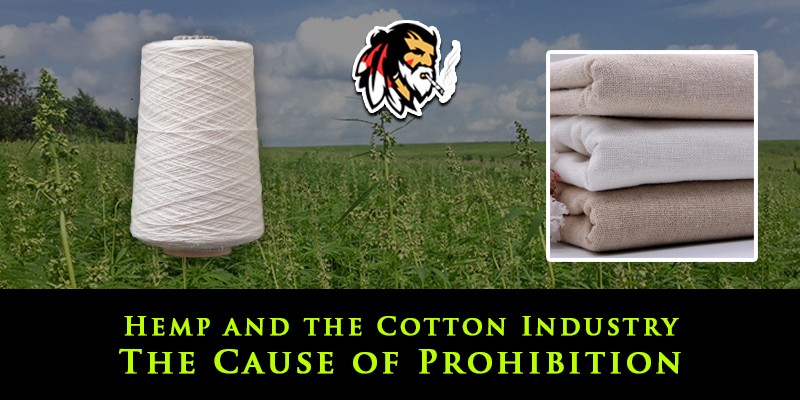Hemp
Hemp and the Cotton Industry – The Cause of Prohibition?
Now that the cannabis industry and that of medical marijuana is continuing to thrive, many have questioned how or why this could not be the case sooner. With the assistance cannabis is providing to those suffering from any manner of conditions in the medical sector, as well as the huge boost in popularity of CBD related products with lots of positive research coming day after day, many onlookers are often curious as to why this evolution could not have happened decades ago.
Here we will delve deeper into the truth, and conspiracy surrounding the prohibition of cannabis and investigate the connections of big industry and the long-held suspicions that the powerful cotton industry of the time had a great deal of influence on the outlawing of cannabis.
The New Billion Dollar Crop
This was the title of an article written by Henry Ford, who, at the time, also incorporated hemp materials in the construction of a car. This shows the value and high esteem with which he, and most others of that period and long before held hemp as a useful material for construction purpose.
In fact, the history of hemp as a highly valuable crop in terms of fiber dates back centuries. Hemp was long noted as an essential crop of the cotton industry in the making of ropes, papers textiles and a range of other products. So important was hemp, the farmers of the time were required by law to grow it.
As the years progressed, more began to realize the extensive benefits to be derived from hemp in the construction industry and beyond. It is much of this usefulness and surging popularity with top businessmen of the day such as Ford which is said to have worried the titans of the cotton industry as a rival in the construction sector particularly.
Many who have studied the sector believe that the wealthy elite industrialists of the time began to see the impact which hemp could have on their businesses to the negative end, and needed a way to outlaw hemp to protect their interests.
1937 Tax Act and the Downfall of Hemp
Going into the second half of the 1930s, the uses of hemp within business and production with the likes of Ford was ramping up. They were able to extract a range of fuels using hemp in a more efficient manner than had previously been the case. The battle lines were even more firmly during that period with DuPont developing nylon and other materials from fossil fuels and holding an extensive number of patents on these materials.
Politics of the time also provided no favors to the hemp industry. Treasury secretary at the time was Andrew Mellon, himself a well-known and influential industrialist. With his weight firmly on the side of big business such as General Motors and Dupont, he wasted no time in crafting a solution the hemp “problem” through the proxy of the 1937 Marihuana Tax Act.
During that period there was a largescale change in the attitude toward marijuana. These attempts to demonize cannabis are thought by many to be an attempt by major industrialists of the time to outlaw hemp, even though hemp, as we all know, is vastly different from marijuana.
This campaign escalated through biased media and propaganda with the movie “Reefer Madness” released in 1936 to help sway public opinion on the negative view of marijuana. Mellon headed up the newly created Federal Bureau of Narcotics with his nieces’ husband, Henry Anslinger who in turn wasted no time in drafting and getting the 1937 tax act through the official channels without a roll call vote and very much unseen and undebated. This was the intent of the anti-hemp and anti-cannabis movement at the time, and every effort was made to prepare the bill in secret and severely limit the knowledge or opportunity of the other side to challenge it.
This act placed all cannabis products under the purview and restriction of the treasury department. This was precisely what the likes of DuPont wanted at the time to completely eliminate the competition of hemp, which also fell under the act as a cannabis related product despite its many essential uses and with no link to the same “high times” lifestyle misinformation which was promoted during that period to display the “evil” nature and threat of marijuana to general society.
The Resulting Downfall
The 1937 act basically put a stop to the cultivation of hemp and its challenge to the dominance of existing major industry such as the cotton industry, construction industry, and others. In fact, shortly after the passage of the act, DuPont wasted no time in filing patents for Nylon. This is all seen as part of the same strategy in what many terms as the “hemp conspiracy”. The timeline of events certainly does no favors to those who attempt to deny such an event.
The bill all but killed the hemp industry in the United States and around the world. Leading to the continued power of those who headed up major industry at the time. One of the biggest issues which many onlookers supporting hemp had, was the failure to make any distinction between marijuana and hemp, categorizing them as equally harmful when this is very far from the truth.
The fact that such a campaign of misinformation and propaganda was engaged in is outrageous to many, both at the time and particularly now when we recognize so many of the benefits across the medical sector and beyond. There is no doubt that, if such a conspiracy exists in the industries of construction, these also extend to the pharmaceutical world.
The Renaissance of Hemp
Nowadays, with the world gradually coming to its senses, hemp is making a comeback. After generations of prohibition, the 2018 Farm Bill has finally paved the way for commercial growth and production of hemp following its reclassification. This is not so much of a comeback as a rebirth for the crop which had been cultivated for centuries prior to 1937.
The overriding hope is that cultivation can be increased and the status of hemp as a premier cash crop can be regained. This can be of great benefit economically for the nation, and on a community level, it can also lead to the easier production of hemp related products. This should help farmers, businesses, and the end consumers as well as the government itself.
Final Thoughts
As with any conspiracy related theory, it is unendingly challenging to prove beyond any doubt. However, all we can do is analyze the events which occurred, who was involved, and their timing. This would certainly paint a picture of correlation and collusion between the powerful industrialists of the time period in the cotton and other industries.
Regardless of how their motivations were designed, the end result was the downfall of a very strong rival industry which had been in existence for centuries before, and which is only now beginning to make a return. It seems fair to conclude that while the cotton industry did not act alone in the desire to prohibit hemp directly, the prohibition of cannabis was certainly helpful to the cause of many powerful figures in industry at the time.


